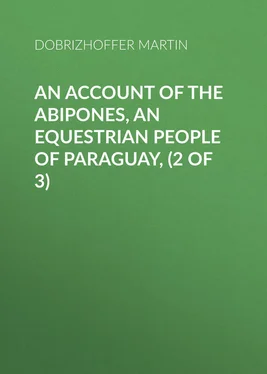Martin Dobrizhoffer - An Account of the Abipones, an Equestrian People of Paraguay, (2 of 3)
Здесь есть возможность читать онлайн «Martin Dobrizhoffer - An Account of the Abipones, an Equestrian People of Paraguay, (2 of 3)» — ознакомительный отрывок электронной книги совершенно бесплатно, а после прочтения отрывка купить полную версию. В некоторых случаях можно слушать аудио, скачать через торрент в формате fb2 и присутствует краткое содержание. Жанр: foreign_antique, foreign_prose, на английском языке. Описание произведения, (предисловие) а так же отзывы посетителей доступны на портале библиотеки ЛибКат.
- Название:An Account of the Abipones, an Equestrian People of Paraguay, (2 of 3)
- Автор:
- Жанр:
- Год:неизвестен
- ISBN:нет данных
- Рейтинг книги:3 / 5. Голосов: 1
-
Избранное:Добавить в избранное
- Отзывы:
-
Ваша оценка:
- 60
- 1
- 2
- 3
- 4
- 5
An Account of the Abipones, an Equestrian People of Paraguay, (2 of 3): краткое содержание, описание и аннотация
Предлагаем к чтению аннотацию, описание, краткое содержание или предисловие (зависит от того, что написал сам автор книги «An Account of the Abipones, an Equestrian People of Paraguay, (2 of 3)»). Если вы не нашли необходимую информацию о книге — напишите в комментариях, мы постараемся отыскать её.
An Account of the Abipones, an Equestrian People of Paraguay, (2 of 3) — читать онлайн ознакомительный отрывок
Ниже представлен текст книги, разбитый по страницам. Система сохранения места последней прочитанной страницы, позволяет с удобством читать онлайн бесплатно книгу «An Account of the Abipones, an Equestrian People of Paraguay, (2 of 3)», без необходимости каждый раз заново искать на чём Вы остановились. Поставьте закладку, и сможете в любой момент перейти на страницу, на которой закончили чтение.
Интервал:
Закладка:
But from this custom of the savages of calling up the shades of the dead, we may deduce that they believe in the immortality of the soul, as may also be collected both from their rites and conversation. They place a pot, a garment, arms, and horses, fastened on stakes upon graves, that the dead may not be in want of the daily necessaries of life. They have an idea, that those little ducks, which the Abipones call ruililiè , and which fly about in flocks at night, uttering a mournful hiss, are the souls of the departed. The Spaniard Raphael de los Rios, who superintended the estate belonging to the town of St. Jeronymo, was cruelly murdered in his tent, in an assault of the savages, whilst I resided there. Some months after, an Abiponian catechumen came and anxiously enquired whether all the Spaniards went to Heaven when they died, and was told by my companion that those who had closed their lives with a pious death alone obtained this happiness. "I agree entirely with you," said the Abipon; "for the Spaniard Raphael, who was killed here lately, seems not to have gained admittance yet; our countrymen say that they see him riding in the plain every night, and hissing in a mournful tone." This, though to be accounted either a mere fabrication, or the effect of fancy, justifies the conclusion, that the savages believe the soul to survive the body, though they are entirely ignorant of what becomes of it, or what may be its fate. The other people of Paraguay too hold the same opinion of the immortality of the soul.
From what I have said of the jugglers, who does not see that all their knowledge, all their arts, consist of nothing but cunning, fraud, and deceit? Yet the savages yield them the readiest faith and obedience during their lifetime, and after their death revere them as divine men. In their migrations, they reverently carry with them their bones and other reliques as sacred pledges. Whenever the Abipones see a fiery meteor, or hear it thunder three or four times, these simpletons believe that one of their jugglers is dead, and that this thunder and lightning are his funeral obsequies. If they ride out any where to hunt or fight, they are always accompanied on their journey by one of these knaves, on whose words and advice they fully depend, believing that he knows and can foretel whatever may conduce to the success of the expedition; he teaches them the place, time, and manner proper for attacking wild beasts or the enemy. On an approaching combat, he rides round the ranks, striking the air with a palm bough, and with a fierce countenance, threatening eyes, and affected gesticulations, imprecates evil on their enemies. This ceremony they think of much avail to securing them a victory. The best part of the spoils are adjudged to him as the fruits of his office. I observed that these crafty knaves have plenty of excellent horses, and domestic furniture superior to that of the rest. Whatever they wish for they extort from this credulous people. The Abipones account it a crime to contradict their words, or oppose their desires or commands, fearing their vengeance. When any of the jugglers are ill disposed towards a man, they call him to their house, and are instantly obeyed. When he is come, they harshly reproach him for some imaginary fault or injury, and declare their intention of punishing him in the name of their grandfather. They order him instantly to bare his breast and shoulders, and then pierce and tear his flesh with the jaw of the fish palometa. The poor wretch dares not utter the least complaint, though streaming with blood, and thinks himself very fortunate in being suffered to depart alive.
At another time, when these bugbears think any one inimical or injurious to them, they will threaten to change themselves into a tiger, and tear every one of their hordesmen to pieces. No sooner do they begin to imitate the roaring of a tiger, than all the neighbours fly away in every direction. From a distance however they hear the feigned sounds. "Alas! his whole body is beginning to be covered with tiger spots!" cry they. "Look, his nails are growing," the fear-struck women exclaim, although they cannot see the rogue, who is concealed within his tent; but that distracted fear presents things to their eyes which have no real existence. It was scarce possible to persuade them out of their absurd terrors. "You daily kill tigers in the plain," said I, "without dread, why then should you weakly fear a false imaginary tiger in the town?" "You Fathers don't understand these matters," they reply, with a smile. "We never fear, but kill tigers in the plain, because we can see them. Artificial tigers we do fear, because they can neither be seen nor killed by us." I combated this poor argument, by saying, "If that artificial tiger which your conjurors assume to alarm you cannot be seen, how, pray, can you tell that tigers' claws and nails begin to grow upon him?" But it was vain to reason with men in whom the extreme pertinacity with which they adhered to the opinion of their ancestors superseded all reason. Should a furious tempest arise, they will all declare the deluge caused by profuse rain to be effected by the arts of the jugglers, and whilst some attribute the flood and hurricane to one, some to another, a still more furious and louder tempest arises amongst themselves. Hear my account of an event which I cannot remember without laughter. In the month of January, a quantity of heavy rain fell in the night, and precipitating itself from a neighbouring hill, nearly overwhelmed the colony of St. Jeronymo. The immense force of waters broke the leathern door, rushed into my hut where I was sleeping, and not immediately gaining egress, increased to about five palms in depth. Awakened by the noise, I put my arms out of bed, and using them as a plumb, measured the depth of the water; and had not the wall, which was perforated by the flood, opened a way to the waters, I must have been obliged to swim for my life. The same thing happened to all the Abipones who dwelt on low ground, their huts being entirely inundated. But lo! the next morning a report was spread, that a female juggler, who had received some offence from one of the inhabitants of the town, had caused this great storm in the intent of drowning the whole horde, but that the clouds had been repulsed, the rain stopped, and the town saved by the interposition of another juggler. That dreadful flood did not extend to the neighbouring plain, where Pariekaikin, at that time chief of the Abiponian jugglers, was then living with some companions, who, after a long drought, were very desirous of getting water. This Pariekaikin in an oracular manner declared, that Father Joseph Brigniel had caused that rain for the advantage of his town, and that because he, Pariekaikin, did not choose to reside there, he had, out of revenge, directed the clouds with such art, that not a drop of rain reached his station. For they made no hesitation in accounting that Father a conjuror, because he happily and speedily healed the sick.
That the American jugglers enjoy familiar intercourse with the evil spirit is not only firmly believed by the ignorant savages, but some writers have even endeavoured to persuade Europe to believe it. For my part, after so long an acquaintance with these nations I could never bring myself to credit it, always remaining of opinion that they neither know, nor are capable of performing any thing above human powers. Being firmly persuaded that they would do me all the evil in their power, I often accosted them in a friendly manner, and by all sorts of good offices endeavoured to prevail upon them to alter their manner of life, and embrace religion; for by their example almost all the rest would regulate their conduct. But this was like washing the blackamoor white: for these wickedest of mortals, unwilling to part with their authority and lucrative office, left no stone unturned, no frauds unattempted to deter and intimidate their countrymen from going to church, attending to the instructions of the priests, and receiving baptism, daily denouncing death, and destruction on the whole nation, unless they obeyed. Nor is this either new or surprizing. In all the American nations the teachers of the holy religion have found the jugglers upholders of ancient superstition, and rocks in the way of the desired progress of the Christian law. Good heavens! what contests, and what trouble did they not cause to Antonio Ruiz de Montoya, the famous Guarany missionary! It was not till he had repressed the authority of the remaining jugglers, and commanded the bones of the dead ones, which were universally worshipped with great honours, to be burnt in the presence of the people, that he converted an infinite number of savages to the Christian religion, and induced them to enter colonies. Till these knavish holophants , and sycophants to speak with Plautus, are abolished, nothing can be done with the savages; this I affirm on experience. The town of St. Joachim not only merited the praise of religion, but produced many fruits of genuine piety. But as snakes often lurk in the grass, and tares in the most abundant harvest, an old Indian secretly performed the office of juggler there, and suffered himself to be adored as a divine person by some foolish women, whom he served in the double capacity of physician, and prophet, at the same time carrying on a criminal intercourse with them. These things were disclosed to me by Ignatius Paranderi, chief Cacique of the town; so that judging it advisable immediately to reprove this mischievous old man in public, since private admonitions were of no avail, I repaired to his house attended by all the chief people of the place; and imitating, in this important business, the thundering tongue of Cicero when he fulminated against Catiline, addressed him in the following manner. "How long, accursed old man, will you belie your profession of Christianity, by daring to corrupt the morals of your fellow-hordesmen with nefarious arts, and indecent conduct? After living near twenty years in the school of Christ, are you not afraid to practise savage rites the most repugnant to Christian laws? Your manner of life is exactly suitable to the name of tiger, (he was called Yaguaretè, which means a tiger;) for by your deceits and indecencies you tear the poor little sheep of Christ. Extreme age has conducted you to the goal of life; – unless you repent, what a wretched death, and when dead what a sad fate awaits you! I am equally ashamed and grieved on your account. He whom you behold dead on the cross for you," said I, showing him a crucifix, "will drive you headlong into hell, to punish your perfidy. Be what you appear, or appear what you are. Regulate your conduct according to divine law. But if savage superstitions are too firmly rooted in your breast to be ever eradicated, return instantly to the woods of the savages, to the dens of wild beasts where you first saw the light, that your example may not pervert the rest of your hordesmen, who have dedicated their lives to religion and virtue. Go, and repent of your former sins, and by penitence and innocence of life, cleanse away the stains of them. If you do not instantly obey my friendly admonitions, it will be worse for you. Henceforward, you shall not go unpunished. Know, that as soon as ever I hear of any act of superstition or indecency committed or attempted by you, at my orders you shall be led about the streets amidst the hisses of the people, and pelted with cow-dung, by a crowd of boys. Such is my firm determination. This is the thyme and frankincense that shall be offered up to the stinking divinity, which you have madly dared to arrogate to yourself and suffered to be adored." This commination left the old fellow alarmed, and, if I mistake not, corrected, all good men highly approving the severity of my speech. No suspicions were ever after entertained of him, though I inspected all things with a vigilant eye and an attentive ear.
Читать дальшеИнтервал:
Закладка:
Похожие книги на «An Account of the Abipones, an Equestrian People of Paraguay, (2 of 3)»
Представляем Вашему вниманию похожие книги на «An Account of the Abipones, an Equestrian People of Paraguay, (2 of 3)» списком для выбора. Мы отобрали схожую по названию и смыслу литературу в надежде предоставить читателям больше вариантов отыскать новые, интересные, ещё непрочитанные произведения.
Обсуждение, отзывы о книге «An Account of the Abipones, an Equestrian People of Paraguay, (2 of 3)» и просто собственные мнения читателей. Оставьте ваши комментарии, напишите, что Вы думаете о произведении, его смысле или главных героях. Укажите что конкретно понравилось, а что нет, и почему Вы так считаете.












